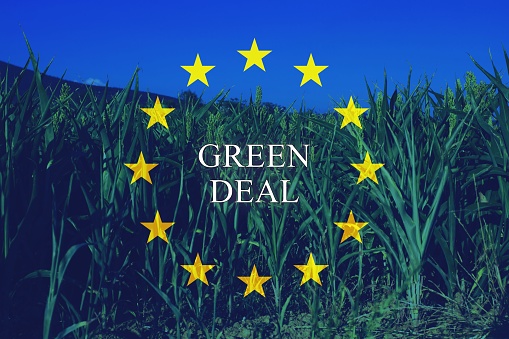1How is energy security perceived based on traditional perceptions?
 Based on traditional understandings, energy security concerns the ability of states to maintain an uninterrupted supply of energy at an affordable and as stable as possible prices.
Based on traditional understandings, energy security concerns the ability of states to maintain an uninterrupted supply of energy at an affordable and as stable as possible prices.2What does energy security consist of beyond traditional understandings?

4 fundamental features:
- Availability of energy resources
- Accessibility
- Acceptance of relevant environmental consequences
- Approachable investments...
3How does the EU approach this?

Via the new EU Energy Security and Solidarity Action Plan:
- Infrastructural needs
- Diversification of energy supply
- External energy relations
- Oil and natural gas reserves
- Crisis response mechanisms
- Energy performance/efficiency
- Better use of the Union's energy resources
REPowerEU, the new EU policy, turns against dependence on Russia and repositions energy security in terms of efficiency and Renewable Energy Sources (RES)
- At the same time, there is a general tendency to disengage from Russia, which is now becoming evident.
4What trends characterise EU energy and climate change policy?
 The conceptual use of energy security in the context of EU energy and climate policy is characterised by 3 trends:
The conceptual use of energy security in the context of EU energy and climate policy is characterised by 3 trends: 1. Persistent emphasis on the traditional perception/conception of energy security, as the security of energy supply, the maintenance of affordable prices, and the mitigation of related risks
2. Establishing an expanded concept of energy security that incorporates additional pillars of energy and climate policy, with the aim of achieving energy security in line with increasingly ambitious climate goals
3. Energy security remains a multifaceted concept whose content has broadened from a limited perspective of supply and affordability to a multitude of features that incorporate principles of the broader concept/framework of sustainability. This is reflected in EU energy and climate legislation and policy, both in terms of general policy objectives and in relation to energy security
5How is the concept of energy security evolving?
 An expanded and more inclusive perception of energy security - this must also encompass the economic, technological, environmental and socio-economic dimensions.
An expanded and more inclusive perception of energy security - this must also encompass the economic, technological, environmental and socio-economic dimensions. This expanded understanding of energy security helps mitigate the risks associated with energy insecurity. In particular, alternative means of achieving energy security are established, while the possibility of a new (energy) crisis emerging that is related to the exposure to pressures related to external geopolitical and economic relations in the international system is reduced.
Energy security as a concept can be difficult to define and often creates confusion as to its exact content. Such confusion may also be reflected in the adopted energy policies. However, there seems to be consensus that energy security is related to threats and risks that are either caused by the energy supply chain or instead impact the said energy supply chain.
These risks may apply to transmission lines, power plants, the fluctuation of demand for energy, the withholding of supplies, sabotage, terrorism, political instability, and geopolitical risks such as wars and embargoes. Risks may also relate to dilemmas regarding renewable energy sources, fossil fuel reserves, and natural disasters.
6How can energy insecurity arise?
 Energy insecurity may arise either due to the interruption of energy supply or due to sudden price fluctuations which may make the supply of energy unaffordable.
Energy insecurity may arise either due to the interruption of energy supply or due to sudden price fluctuations which may make the supply of energy unaffordable. Energy insecurity may occur at any time and evolve from a simple, minor concern to an existential threat. The latter may arise as a result of political and military factors related to energy, thus beyond economic factors.
Additionally, energy insecurity is particularly important - and unique - because of the serious consequences it may have for the functioning of the state.
7What challenges are present that prevent achieving energy security goals with ease?
 Strategic Energy Review on an energy policy for Europe:
Strategic Energy Review on an energy policy for Europe: 4 energy insecurity pillars
- Import vulnerability, supply shortages, potential energy crises and uncertainty regarding future supply.
- Also, it should be noted that 'turbulences' of this kind are defined as interactions of events or demands that are highly variable, inconsistent, unexpected or unpredictable (Ansell et al.)
- A turbulence as such may be related to energy insecurity and, by extension, the possibility of a new crisis emerging.
- 2 major (and possibly conflicting) developments affecting Cyprus in particular are the construction of the East Med Pipeline and the 22nd June Agreement, as well as the (possible) arrival of LNG. It should also be noted that the movement of the world market towards LNG entails many potential benefits.
8Can the goal of energy security be achieved making good use of the Eastern Mediterranean?
 Through the exploitation of the Eastern Mediterranean, energy security can be achieved at a significant rate of 6-10%.
Through the exploitation of the Eastern Mediterranean, energy security can be achieved at a significant rate of 6-10%.9Are renewables enough to make the EU more competitive?
 No, the EU's competitiveness cannot be fully achieved through RES alone, due to the existence of numerous problems, such as inflation and energy poverty. Instead, the EU will need new investments in order to achieve goals like energy transition.
No, the EU's competitiveness cannot be fully achieved through RES alone, due to the existence of numerous problems, such as inflation and energy poverty. Instead, the EU will need new investments in order to achieve goals like energy transition.10Is it possible to cover the energy needs in Cyprus through wind energy?
 No, because wind speeds fail to meet the energy needs through this medium. However, the energy needs of Cyprus can be met through photovoltaics (solar panels).
No, because wind speeds fail to meet the energy needs through this medium. However, the energy needs of Cyprus can be met through photovoltaics (solar panels).11Sources
-Ang, B. W., Choong, W. L., & Ng, T. S. (2015). Energy security: Definitions, dimensions and indexes. Renewable and Sustainable Energy Reviews, 42, 1077–1093. https://doi.org/10.1016/j.rser.2014.10.064
-Ansell, C., Trondal, J., & Øgård, M. (2016). Turbulent governance. In C. Ansell, J. Trondal, & M. Øgård (Eds.), Governance in turbulent times (pp. 1–26). Oxford University Press.
-Chester, L. (2010). Conceptualising energy security and making explicit its polysemic nature. Energy Policy, 38(2), 887–895. https://doi.org/10.1016/j.enpol.2009.10.039
-Christou, O. (2021). Energy Security in Turbulent Times Towards the European Green Deal. Politics and Governance (ISSN: 2183–2463), Volume 9, Issue 3, Pages 360–369. https://doi.org/10.17645/pag.v9i3.4336
-European Commission. (2008b). An EU energy security and solidarity action plan (COM(2008) 781).
-Winzer, C. (2012). Conceptualizing energy security. Policy, 46, 36–48. https://doi.org/10.1016/j.enpol.2012.02.067
-Ansell, C., Trondal, J., & Øgård, M. (2016). Turbulent governance. In C. Ansell, J. Trondal, & M. Øgård (Eds.), Governance in turbulent times (pp. 1–26). Oxford University Press.
-Chester, L. (2010). Conceptualising energy security and making explicit its polysemic nature. Energy Policy, 38(2), 887–895. https://doi.org/10.1016/j.enpol.2009.10.039
-Christou, O. (2021). Energy Security in Turbulent Times Towards the European Green Deal. Politics and Governance (ISSN: 2183–2463), Volume 9, Issue 3, Pages 360–369. https://doi.org/10.17645/pag.v9i3.4336
-European Commission. (2008b). An EU energy security and solidarity action plan (COM(2008) 781).
-Winzer, C. (2012). Conceptualizing energy security. Policy, 46, 36–48. https://doi.org/10.1016/j.enpol.2012.02.067




